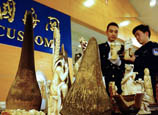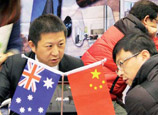
In the joint interview Tuesday, Xi said his visit to Russia shows the "high level and special nature" of the comprehensive strategic cooperative partnership between the two countries.
Ruan said China's relations with Russia, the first leg of Xi's trip, have already reached a stage featuring a "high level of mutual trust," with both countries seeing each other's development as an opportunity.
"The zero-sum mentality, namely believing one party's success means the other's failure, has been one of the major factors hampering mutual trust and creating conflicts between major powers," he said.
Ruan pointed out that although Sino-Russian relations have seen marked progress in the past decade, this does not mean there are no problems in the bilateral relations.
"Both sides, however, agree not to let these differences restrain the development of bilateral relations," Ruan said.
MAIDEN TRIP NOT TARGETING A THIRD PARTY
Analysts here also point out that Xi's maiden overseas voyage as China's head of state is not of an exclusive nature and does not target a third party.
Zhang Yuanyuan, former Chinese ambassador to Belgium, said China's foreign policy is inclusive.
During his nine-day tour, Xi is scheduled to pay state visits to Russia, Tanzania, South Africa and the Republic of Congo. He is also expected to attend the fifth leaders' summit of BRICS countries in Durban, South Africa.
Zhang said the visits involve multiple factors, including a world power and a neighboring country, developing countries and multilateral cooperation, all of which have been among China's foreign policy priorities.
During the week since Xi was elected president, other Chinese leaders have received important guests and maintained contact with leaders from other countries.
In a phone conversation on March 14, Xi and U.S. President Barack Obama both promised to make efforts to achieve the goal of building a new type of inter-power relationship.
While meeting with U.S. Treasury Secretary Jacob Lew here on March 19, Xi urged the two nations to objectively view each other's development stages, respect each other's interests for further development and regard the other party's opportunities and challenges as its own.
Zhang pointed out that building a new type of inter-power relationship and exploring ways for the two major powers to get along with each other could straighten out Sino-U.S. relations and break the historical curse in which "conflicts between major powers are inevitable."
Meanwhile, Ruan Zongze dismissed concerns about Xi's itinerary, saying such concerns are "totally unnecessary."
"The reason for China to pursue the building of a new type of inter-power relationship is that it will not embark on the path of alliance," he said.
"The age of old-school alliances or jointly targeting a third party has long passed," Ruan said.

















 Now you can use mobile phone to 'call' the dead
Now you can use mobile phone to 'call' the dead


![]()
